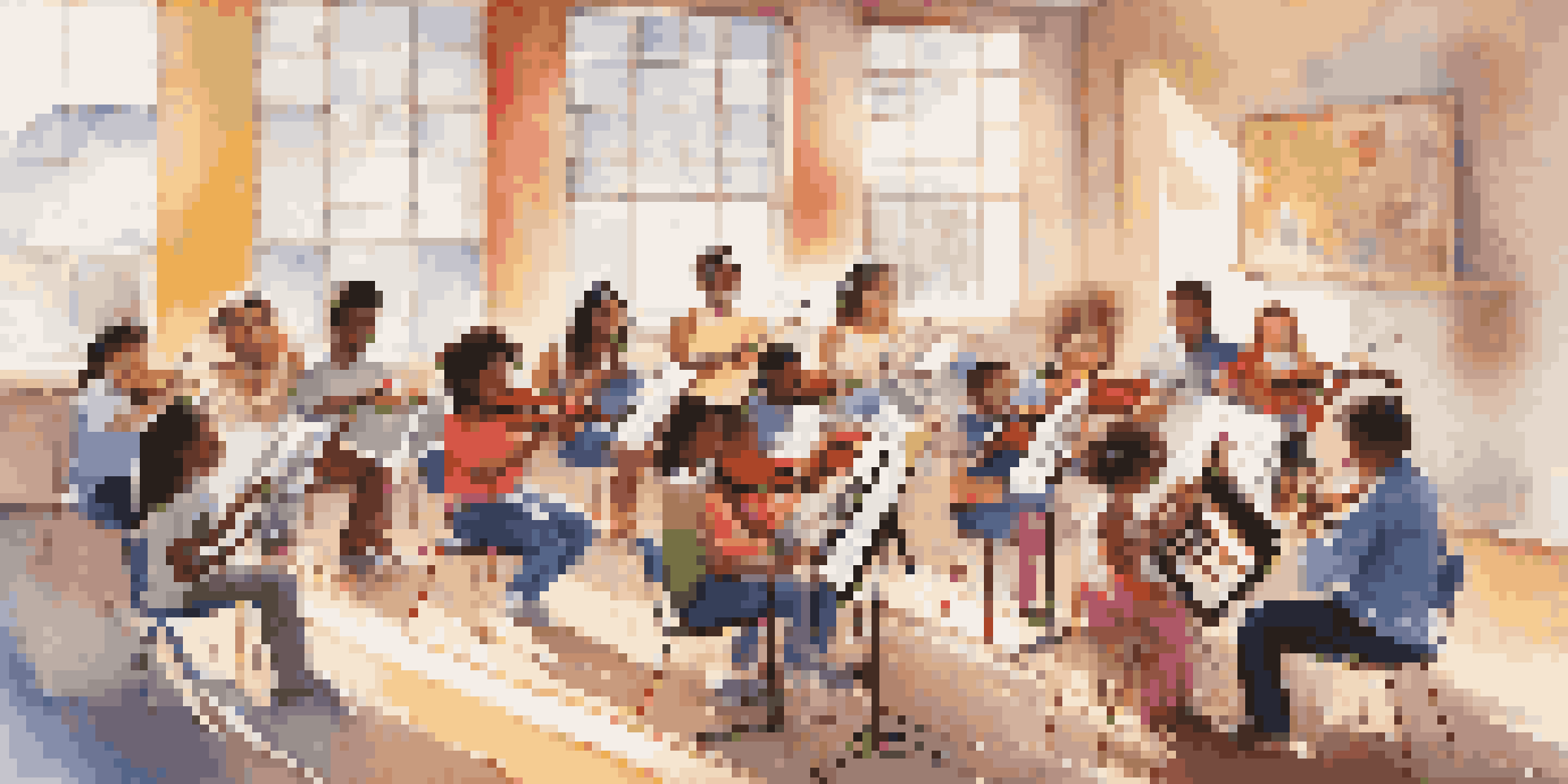The Role of Music Education in Building Community Resilience

Understanding Community Resilience Through Music Education
Community resilience refers to the ability of a community to withstand and recover from challenges. Music education plays a vital role in this process by bringing people together, fostering collaboration, and encouraging emotional expression. When individuals engage in music, they build not just skills but also relationships that can support them during tough times.
Music can change the world because it can change people.
Think of music education like a glue that binds people. Whether it's through choir, band, or informal jam sessions, the shared experience of creating music cultivates a sense of belonging. This connection can be particularly important in communities facing adversity, as it helps individuals feel supported and less isolated.
Moreover, music serves as a universal language that transcends barriers. In diverse communities, music education can bridge cultural gaps, promoting understanding and appreciation among different groups. This inclusivity strengthens the overall fabric of the community, enhancing its resilience.
The Emotional Benefits of Music Education for Communities
Engaging in music can significantly boost emotional well-being, which is crucial for community resilience. Music education helps individuals process their feelings and express their emotions in a constructive manner. This is especially important during crises, when people may struggle to articulate their experiences.

For instance, participating in a music program allows individuals to channel their stress, grief, or anxiety into creativity. This not only aids personal healing but also fosters a supportive atmosphere within the community. When people share their struggles through music, it creates a safe space for others to do the same.
Music Builds Community Connections
Music education fosters collaboration and emotional expression, creating strong bonds among community members.
Furthermore, collective musical activities, such as community concerts or group lessons, promote a sense of shared experience. These gatherings can uplift spirits, reinforce social bonds, and instill hope, which are all vital components of resilience. In this way, music education becomes a powerful tool for emotional connection and healing.
Music Education as a Catalyst for Social Cohesion
Social cohesion is essential for a resilient community, and music education can be a key driver in achieving this. When people come together to learn and create music, it fosters trust and collaboration among participants. These interactions can help break down barriers and encourage inclusivity, making everyone feel valued.
The power of music makes all the difference in the world.
Consider community bands or orchestras where members from various backgrounds unite to perform. The shared goal of making music together promotes teamwork and understanding, which can translate into other areas of community life. This sense of unity enhances collective problem-solving abilities and resilience.
By nurturing social ties, music education creates a network of support that individuals can rely on during challenging times. When community members feel connected to one another, they are more likely to work together to address issues, whether they are social, economic, or environmental.
Building Skills for Resilience Through Music Education
Music education does more than just teach notes and rhythms; it equips individuals with essential life skills. Skills such as discipline, perseverance, and teamwork are cultivated through learning music, which are directly applicable to facing life's challenges. These attributes contribute to a community's overall resilience.
For example, learning to play an instrument requires practice and dedication. This process teaches students the value of hard work and the importance of setting and achieving goals. In times of hardship, these skills can empower individuals to tackle obstacles with confidence.
Emotional Healing Through Music
Engaging in music helps individuals process emotions and promotes a supportive atmosphere during challenging times.
Moreover, music education encourages creativity and adaptability, which are crucial in navigating change. When students encounter difficulties in their musical journey, they learn to think critically and find alternative solutions. These experiences prepare them to handle various challenges in life, reinforcing community resilience.
The Role of Leadership in Music Education Programs
Effective leadership is vital in music education programs, as it sets the tone for community engagement and resilience-building efforts. Leaders who are passionate about music can inspire and motivate individuals to participate and invest in their community. This strong leadership fosters a culture of collaboration and support.
Consider a community music director who actively involves participants in decision-making processes. This approach not only empowers individuals but also helps them feel a sense of ownership over their musical experience. When community members are invested, they are more likely to contribute positively to the group's resilience.
Additionally, leaders can facilitate connections between music education and local resources, such as mental health services or community organizations. By forging these partnerships, music education programs can provide comprehensive support, enhancing the community's ability to thrive in the face of adversity.
Case Studies: Successful Music Education Initiatives
Examining successful music education programs can provide valuable insights into their impact on community resilience. For example, initiatives like 'El Sistema' in Venezuela have demonstrated how music education can transform lives and communities, fostering social change and resilience among impoverished populations. Through structured music programs, children gain not only musical skills but also personal development.
Closer to home, community choirs in areas affected by natural disasters have proven effective in helping individuals cope with trauma. These choirs create a sense of belonging and support, allowing participants to express their feelings and heal collectively. The stories emerging from such programs underscore the transformative power of music education.
Leadership Enhances Music Programs
Effective leadership in music education cultivates participation and fosters resilience by connecting community members to resources.
These case studies highlight the potential of music education as a tool for resilience. They serve as reminders that when communities invest in music, they invest in their own strength and unity, ensuring a brighter future for all.
The Future of Music Education in Building Resilience
As we look to the future, the role of music education in building community resilience is more important than ever. With ongoing societal challenges, fostering strong connections through music can provide a sense of hope and empowerment. Communities that prioritize music education are better equipped to navigate adversity together.
Technological advancements also offer new opportunities for music education. Online platforms and resources can make music learning more accessible, allowing broader participation across diverse communities. This inclusivity can further enhance resilience by ensuring that everyone has a voice and a chance to contribute.

Ultimately, the future of music education lies in its ability to unite individuals, strengthen bonds, and cultivate resilience. By embracing music as a vital part of community life, we can create a harmonious society ready to face whatever challenges come our way.